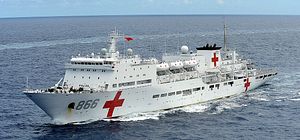On December 15, the Chinese People’s Liberation Army-Navy’s (PLAN) hospital ship, the Peace Ark, visited Dili, the capital of Timor-Leste. The vessel will spend eight days in Timor-Leste on a good will visit, where it will provide “humanitarian medical services,” according to Chinese state media.
This is the first time the PLAN has sent a hospital ship to Timor-Leste and the second overall visit by PLAN vessels to the relatively young Southeast Asian state, which gained its independence from Indonesia in 2002. In January 2016, a PLAN task force comprising a destroyer, a frigate, and a supply ship visited Timor-Leste for five days.
Several prominent Timor-Leste officials participated in a welcome ceremony for the Chinese vessel on Friday, including the country’s minister for defense and security, Cirilo José Cristovão. According to Chinese reports, the “Chinese Ambassador to Timor-Leste Liu Hongyang, Chinese military attaché Huang Damin, [and] working staff of the Chinese Embassy in Timor-Leste” also welcomed the vessel.
“The PLA has extensive experience in humanitarian aid and disaster relief and the two countries can further deepen their cooperation in such fields,” Cristovão noted. He praised the visit of the Chinese vessel as a boon to bilateral ties between Beijing and Dili, which have been accelerating in recent years.
China is an increasingly important diplomatic partner for Timor-Leste, with many in Dili positively dis-positioned toward Beijing given its financial support for Timor-Leste’s independence in the early 2000s. In May 2002, following the country’s formal independence, China was the first country to establish diplomatic ties with Timor-Leste.
In 2014, China became Timor-Leste’s third most important source of imports, following neighboring Indonesia and Singapore. China has additionally underwritten and financed the construction of official buildings in Timor-Leste, including the offices of the country’s Ministry of Foreign Affairs, Defense, and the Presidential Palace.
As David Hutt has explained before in The Diplomat, Timor-Leste has shown to diverge from China on important strategic matters, including by supporting international law and arbitration in the South China Sea. In 2016, following the unfavorable verdict for Beijing by a Hague-based tribunal at the Permanent Court of Arbitration in the 2013 case filed by the Philippines, Dili voiced its support in an official statement.
“The role of the United Nations and the international community was pivotal in the restoration of our independence and the development of our Nation State. Timor-Leste strongly supports an international rules based order that promotes peace, protects the rights of nations and provides a mechanism for dispute resolution,” the statement noted.
Timor-Leste’s position was likely influenced by its participation in a then-ongoing arbitration by a Hague-based tribunal at the Permanent Court of Arbitration process to delineate a maritime boundary in the Timor Sea with Australia. Timor-Leste had initiated the arbitration proceedings.
The two countries reached an agreement in September 2017.

































